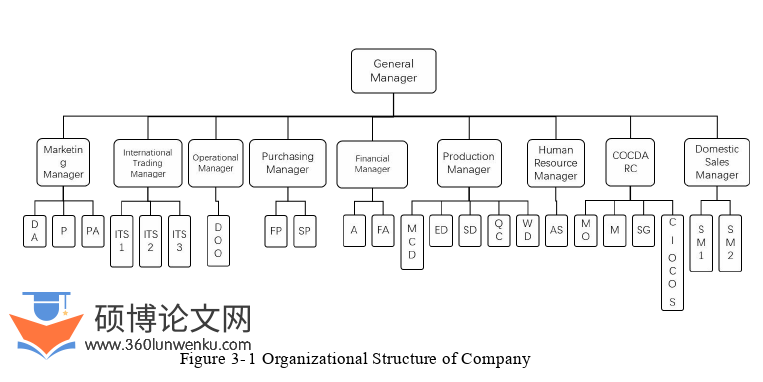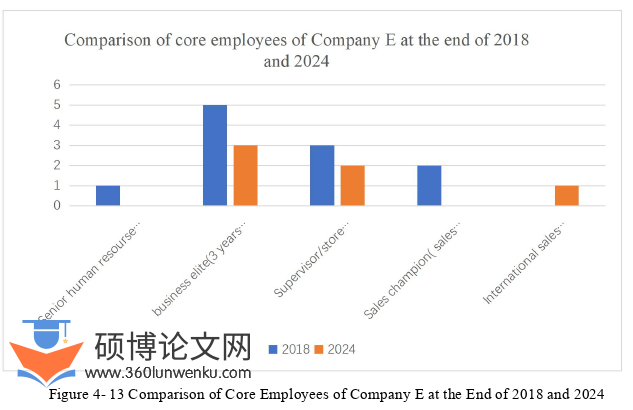本文是一篇酒店管理论文,本研究发现,E公司在员工激励方面存在薪酬竞争力不足、长期激励措施及合伙人晋升通道缺失、委托代理关系处理不当、绩效考核体系不完善以及企业文化建设滞后等问题,导致核心员工流失。这些问题的根源在于E公司核心竞争力不强,且企业主对长期激励机制的重要性认识不足,且缺乏有效的实施策略。
Chapter 1 Introduction
1.1 Research Background
With the challenges after the epidemic,the Chinese economy is facing severetests.The sluggish domestic investment and consumption have made foreign tradingas an important engine to drive economic growth.However,small and medium-sizedprivate foreign trading enterprises have many deficiencies in human resourcemanagement,with the typical feature being a strong sales department and a lack ofprofessional management in the human resources department.Take Company E as anexample.As a sales-oriented private enterprise,its business model focuses onproviding high-quality hotel linens and providing one-stop solutions for brand hotels.However,the company's management model has family characteristics.The businessowner serves as the company's CEO and lacks the participation of professionalmanagers.Due to the limited ability and energy of the business owner himself,thereare too many things to worry about,which ultimately leads to unsatisfactorymanagement results.
With the continuous advancement of China's socialist modernization and theaccelerated development of economic globalization,talent resources play anincreasingly important role in enterprises.Outstanding talents are not only favored bythe times,but also a key factor in winning in corporate competition.

酒店管理论文怎么写
....................
1.2 Research significance
(1)Practical significance.
Competition is everywhere in the business world,and the most intensecompetition is often the competition for talent.Talent is the core resource that drivesthe growth of an enterprise and is vital to any enterprise.Every industry has itsindispensable core talents,who play a key role in the enterprise and play a vital role inthe success of the enterprise.Private entrepreneurs have shown great concern abouthow to select and implement effective incentives to attract and retain theseoutstanding talents.In general,in order to mobilize the enthusiasm and creativity ofemployees,enterprises need to establish and improve an effective incentive system.
A reasonable employee incentive mechanism is crucial to improving the enthusiasm and fighting spirit of employees.It can not only enhance the marketcompetitiveness of enterprises,but also attract talents and reduce talent loss.At thesame time,this approach helps to enhance employees'sense of belonging to the teamand plays a positive role in shaping corporate culture(Li,2015).Therefore,formulating a scientific and reasonable employee incentive system is a key factor forenterprises to attract talents.
(2)Theoretical significance.
Domestic and foreign scholars have long conducted extensive theoretical researchon the core employee incentive mechanism,and these studies have providedimportant theoretical support for the human resources(HR)sector in corporatemanagement.Through in-depth research on E Company and understanding its currentincentive management status,this study will reveal it’s problems and correspondingcauses of E Company's core employee incentives.Based on these findings,this paperwill establish a core employee incentive plan based on relevant incentive theories.Theplan aims to stimulate the work enthusiasm and creativity of core employees and hasgood practical guiding significance for promoting the long-term and stabledevelopment of E Company.
............................
Chapter 2 Literature Review
2.1 Theoretical Overview
2.1.1 Principal-Agent Theory
In this paper,The principal-agent theory proposed by American economistPauline in the 1930s revealed the defects of the model in which the owner of anenterprise also serves as the manager in actual operation.The theory emerged with therapid development of mass production and productivity.There are two main reasonsfor this:on the one hand,with the improvement of productivity,the division of laborhas become more refined;on the other hand,in this process,a group of agents withprofessional skills have gradually emerged.They have sufficient ability and potentialto effectively exercise the power entrusted to them.However,there may be a conflictof interest between the principal and the agent.The principal pursues wealthmaximization,while the agent pursues personal income,leisure time and luxuryconsumption maximization.Therefore,it is necessary to establish an effective systemto regulate the behavior of the agent to protect the interests of the principal.(Berle,1932)
...................
2.2 Overview of core staff
2.2.1 Several definitions of core employees of an enterprise
(1)Core employees are typically defined as those who interact directly withcustomers,either through face-to-face meetings or via telephone for businessnegotiations,as they represent the image of the company;they also include employeeswho are responsible for key operations in the enterprise,which are crucial for thesurvival of the business.
(2)Core employees refer to employees whose jobs require a long period of education and training,and who must possess high professional skills and expertise,such as financial directors,sales technicians,etc.,or who must have extensive workexperience and outstanding management skills in the industry,such as sales managers,sales champions,etc.Although they are few in number,they are particularly important.Once core employees leave,it may have a significant impact on the company'soperations.Replacing them is not only difficult,but may also require expensiverecruitment and training costs.
(3)Core employees include those employees who have professional skills,richindustry knowledge,or excellent management capabilities in the company,and whocontributed greatly to the company's success.Because they are difficult to be replacedand the cost of replacement is high,they are regarded as precious and scarce resourcesof the company and play crucial role in the long-term development of thecompany(Feng,2005).
..............................
Chapter 3 Case Description ......................... 26
3.1 E Company Profile .................................... 26
3.2 The Turnover of Core Employecs at Company E ............................ 30
Chapter 4 Case Issue Analysis .......................... 43
4.1 Survey on Existing Incentive Effectiveness Among Core Employees at Company E ............................. 43
4.2 Survey on Existing Incentive Effectiveness Among Core Employees at Company E ........................ 52
Chapter 5 Design of long-term incentive system for core employees of E Company ......................... 84
5.1 Economic long-term incentive system .......................... 88
5.1.1 Phantom Stock Incentives Based on Relative EVA ................... 89
5.1.2 Performance Unit Incentive Program ...................... 94
Chapter 5 Design of long-term incentive system forcore employees of E Company
5.1 Economic long-term incentive system
Company E is a private enterprise that is not listed on the stock market.Thecompany's operating performance should focus on the company's real economicindicators,such as the return on assets(ROE)and economic value added(EVA).Itcan also focus on the company's profit growth ability,such as the net profit growth rate and the main business growth rate.Company E has strong growth potential.Itsstrategic plan is to increase its turnover to 200 million yuan within 2-3 years and thengradually expand its scale.Because it takes a long time to go public,at least 5 years,long-term incentive tools such as stock options based on value-added may lose theirincentive effect due to the emergence of"diving options".Therefore,the stock optionsin the several long-term incentive models introduced in Chapter 2 are more difficult toimplement.These two incentive models are not included in the design here.Aftercomprehensively analyzing the several long-term incentive models mentioned above,we will design the following comprehensive incentive model(Xiang,2012).

酒店管理论文参考
.........................
Chapter 6 Conclusion and Prospect
6.1 Conclusion
In view of the core talent loss of E Company,the long-term sustainabledevelopment has faced challenges.This study conducted questionnaire surveys andinterviews with core employees,including in-depth interviews with some coreemployees who have left.It was found that E Company’s employee incentives areinsufficient in salary competitiveness,lack of long-term incentives and partnershippromotion incentives,improper handling of agency relationships,imperfectperformance appraisal system,and relatively backward corporate culture construction.The deeper problem is that as a manufacture-trade integration,E Company’s corecompetitiveness are not strong,and the business owners lack awareness of theimportance of long-term incentives,and lack methods to implement an effectivelong-term incentive system.In addition,the article refers to a variety of incentivetheories,comparing and analyzing several long-term incentive systems suitable fornon-listed companies,and combining the characteristics of E Company to propose theconstruction of a long-term incentive system for core employees,including aneconomic incentive system and a non-economic incentive system.
reference(omitted)
